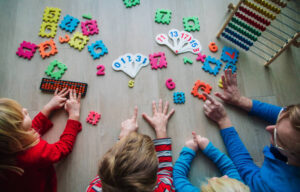Teamwork is all about people coming together to reach a shared goal in the most effective and efficient way possible. It’s about tapping into each person’s unique abilities and sharing feedback constructively, even when there might be personal disagreements among the team members.
What is Teamwork for Kids?
For children, teamwork is about joining hands with their peers during playtime, solving puzzles together, or engaging in group activities. It introduces them to vital social skills such as sharing, cooperating, and respecting diverse viewpoints. Early experiences of teamwork help children learn to interact positively and effectively with others.
What are Teamwork Skills?
Essential teamwork skills encompass
- Effective communication
- Commitment to the group’s goals
- Adept problem-solving
- Reliability
- The ability to listen
- Respond to feedback
- Empathy
- Flexibility
- Prioritizing the team’s goals
What are Examples of Teamwork?
Teamwork might look like:
- A group of colleagues pulling together to meet a tight deadline
- Athletes on a sports team executing a well-coordinated play
- Students collaborating on a school project.
In each case, everyone contributes their best efforts and skills, culminating in shared achievements.
What is the Foundation of Effective Teamwork?
At the heart of effective teamwork lies trust and clear communication. When team members trust each other and communicate effectively, they set the stage for smooth collaboration and efficient problem-solving, which are key to any team’s success.
What is a Key Step in Teamwork?
A critical step in fostering successful teamwork is to set clear and achievable goals. This involves clearly defining what the team aims to achieve, ensuring everyone is on the same page, and agreeing on the methods to reach these goals. Clear objectives help streamline efforts and promote unity within the team.
What are the Benefits of Teamwork?
Teamwork boosts overall performance, sparks more innovative ideas, and accelerates problem-solving. It also enhances job satisfaction and morale, as team members feel valued for their contributions. Collectively, a team can accomplish much more than individuals working solo.
What is the Role of the Team Leader in Promoting Teamwork?
The team leader plays a pivotal role in encouraging teamwork by inspiring and motivating the team, setting clear objectives, and promoting an environment of open communication and cooperation. Effective leaders also manage conflicts constructively and ensure that the team collaborates smoothly towards their common goals.
Conclusion:
In conclusion, teamwork is fundamental to achieving shared goals efficiently and effectively, whether in playful settings among kids or professional environments. It harnesses individual strengths and fosters a sense of unity and accomplishment. At its core, successful teamwork requires trust, open communication, and a focus on collective over individual success, making it a cornerstone of both personal development and organizational achievement.
Thank you for reading our blog! We hope you found the information helpful and engaging. Don’t forget to explore our latest blog “Why Time Management is Key for Students” for more insights. As one of the “best igcse schools in whitefield”, we offer a variety of programs designed to enrich your child’s learning experience. You can explore our website to find all the details about our school and the various programs we offer. Happy reading!
FAQs:
What is not an important factor in teamwork?
Individual accolades and internal competition are less important in a team setting. The essence of teamwork is in each member contributing to the team’s collective success rather than seeking personal recognition.
What is the difference between teamwork and collaboration?
Teamwork involves pooling together individual efforts towards a unified goal, whereas collaboration goes a step further, integrating diverse skills and ideas more deeply to innovate or create something new.
What is an essential aspect of successful teamwork?
Open and effective communication is vital for successful teamwork. It helps in reducing misunderstandings and keeps all team members aligned with the team’s objectives.








